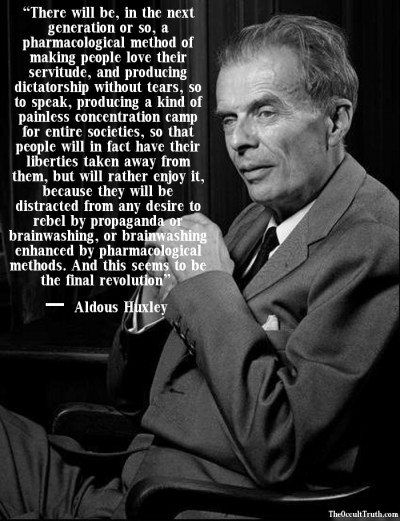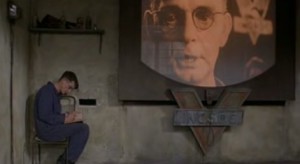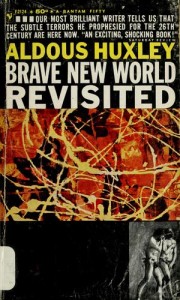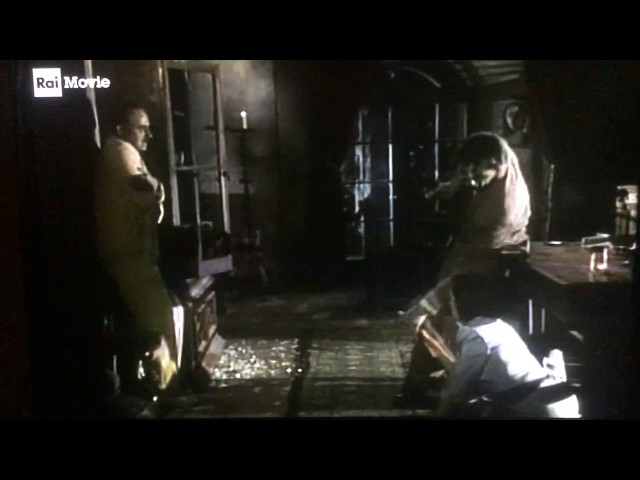Erosion of democracy in contemporary society
“The final revolution: a kind of painless concentration camp for entire societies”: fact or fiction?
Writing about Berlusconi’s Italy also means discussing the shrinking of democracy in the contemporary Western world. Berlusconi’s ventennio (the twenty years from 1994 to 2014) is a privileged observatory of the negative tendencies of modern capitalism, of the erosion of some democratic principles in the XXI century. The Berlusconi phenomenon was foreseen by English and American ‘dystopian’ writers of the XX century, from G. Orwell’s Nineteen eighty-four to S. Collins’s Hunger Games. In particular, in his 1958 long essay Brave New World Revisited, A. Huxley prophesied it all: his message is a mirror reflecting our society’s distorted face, like Dorian Gray’s portrait after it has been stubbed by its sitter.
So, is the ‘painless concentration camp for entire societies’ realistic or just fictional?
Read and find out, but first hold your breath…
Berlusconi’s Italy and the shrinking of democracy in the contemporary Western world

Writing about Berlusconi’s Italy is also a way to write about the shrinking of democracy in the contemporary Western world. Berlusconi’s ventennio (the twenty years from 1994 to 2014) is a privileged observatory of the negative tendencies of modern capitalism, of the erosion of some democratic principles in the XXI century that were achieved in the previous one with long and often violent struggles. Berlusconi’s rule may well be compared to the tip of an iceberg under which lies the contemporary post-industrial societies governed by the multinational corporations since, at least, the birth of globalization in the 1990s (N. Klein’s 1999 No Logo, the bible of the anti-global movement, is a book that proves this topic unequivocally). Berlusconi is the local face of ‘neo-con’ thought, which has become the only existing ideology in the world (even now P.M. Matteo Renzi, the former demolition man, is going down the same track: just a quick look at his planned constitutional changes and economic reforms, disguised as neo-socialist instances, makes it unequivocally clear). Berlusconi’s period is marked by business governing politics, by the reduction of the welfare state and by demagogic propaganda, all neo-conservative features.
But Berlusconi’s age is also something more and unique, a democratic collapse which has taken place only in Italy and that, consequently, must be a warning to the world before other democratic countries follow that dangerous trail. In my country, in fact, a mafia-linked business magnate and media tycoon, constantly in trouble with justice and drenched in vice, was able to become the most popular political leader and the absolute master of the country for such a long period. This happened because Berlusconi is the very symbol of a concentration of political, economic and media power in one single person never seen before, a fact that has created the greatest conflicts of interests in the Western World: his almost complete control of all Italian information became a Weapon of Mass Deception that turned viewers into faithful voters, his laws ad-personam made him almost untouchable by the Judicial Power and favoured his business and financial activities in an unfair game. Berlusconi is the emblem of corruption, of disrespect for the law, of the liaison organized crime – politics, of immoral behaviour that are typical of that ‘immoral majority’ of the country which has no civic and civil consciousness.
The Berlusconi phenomenon was foreseen by English and American ‘dystopian’ writers of the XX century
What is strange is the fact that the Berlusconi phenomenon was anticipated, foreseen and theorized by English and American ‘dystopian’ writers of the XX century, from G. Orwell to S. Collins, as I claim in part III I of my book. These writers show a near-future or future society which is a new kind of non-violent but more effective totalitarian regime which is only a few steps ahead of our contemporary reality. They were able to see how the development of technology, of which we are so proud of, is the main weapon in the would-be dictator’s hands: they predicted that the concentration of media, economic and political power in fewer and fewer hands would create a new Big Brother. In the eBook format of this essay, an appendix is dedicated to one of the most acute writers of the genre, Aldous Huxley, whose essay Brave New World Revisited, published in 1958, is astonishingly precise in describing a Berlusconi-like new type of dictator.
As I just said, the dystopian novelists’ forecast has found their testimonial in Berlusconi, the icon of modern deranged liberal societies. The development of B.’s phenomenon has for sure been helped by unique factors like the fertile terrain of historic illegality, lack of civil consciousness and basic egotistic instincts, but these cannot mask the inadequacy of the democratic institutions in today’s Hi-Tech globalized social environment.
G.W. Bush is another example of what the dystopian writers predicted: he was a President who represented the interests of oil and weapons corporations so closely to wage wars for their sakes, conflicts which were motivated with lies (i.e. Saddam’s Iraq having WMD) repeated over and over again in the media. Nevertheless, Bush, who paradoxically had to thank 9/11 for the ‘war opportunities’, was never in serious trouble with justice, was never accused of dealing with the mafia, never issued ad-personam laws and never delegitimized the judiciary system and the American democratic institutions in general.
Democracy in danger: Nineteen Eighty-Four by George Orwell
Without any doubt the most famous novel of this genre is Orwell’s fable. Even if today we often forget where the title of the reality show Big Brother comes from, a Big Brother watching us as symbol of dictatorship and social control is what is commonly remembered of Orwell’s 1948 novel. Due to B.’s face surgery, hair implantation and make up, the moustachioed face of ever-present evergreen Big Brother is exactly the same as B.’s ageless visage that is watching us from television screens everyday; the more so in the mega posters filled with doublethink populist slogans. But in re-reading the book today, in the light of what we have said so far and of what we are witnessing in the Western contemporary world, so many current issues I have pointed out are there.
Last but not least, the Wikileak Files Gate and the more recent Datagate revelations that the USA are spying on every single piece of communication and information we share were already foretold in that narrative. Our surprise in finding that out seems quite childish. Orwell’s slogan B.B. is watching you is at work right now in such an efficient way the Thought Police could not have imagined. The telescreen-style constant control on the individual, of whose freedom the system is so scared, is what has become evident in these very days. As Noam Chomsky pointed out, Government will use whatever technology is available to combat their primary enemy – which is their own population (see post on Edward Snowden’s dangerous truths)
Democracy in danger: Brave New World by Aldous Huxley
In addition to what we have said in the previous paragraph, there are many other aspects of Orwell’s novel that can be found in Berlusconi’s rule). Nineteen Eighty-Four’s tyranny still needed a good deal of violence to keep the social structure intact; instead, in Brave New World physical violence has disappeared but that society is scarier than Orwell’s just for this reason: violence is no more necessary to keep society steady and hold power. In fact, the chemical predestination of unborn children and the constant infant conditioning produce a kind of false happiness which is really discomforting for the reader. And just in case a tablet of soma (a kind of compulsory anti-anxiety drug) is always there, ready to erase a light social uneasiness when human nature wants to come back from its chemical lethargy. Humanity, desires, instincts, passions, love and hate have been scientifically cancelled in individuals, eradicating the risk of rebellion against the social order, a puppy-like humanity which accepts a hyper-capitalistic society based on forced goods consumption.
Democracy in danger: Brave New World revisited by Aldous Huxley
Huxley’s 1958 long essay Brave New World Revisited is, as anticipated, the most important text of this genre. Its predictions are so unbelievably precise that I have decided to add an appendix to the eBook version of my book on Berlusconi’s Italy, a miscellanea of quotations from that text with notes, to make the reader understand the extent of Huxley’s foresight. The writer predicts that in the future power will be concentrated in fewer hands, joining together Big Business, media control and political power, and that most likely the future political leader will be the personification of this Power Elite. Huxley also foresees the development of the Thought Manufactures, social engineers who will apply the same techniques used for publicity to politics, making thought control a perfect working machine thanks to the development of mass communication. Consequently, the would-be political leader will have the opportunity to become a would-be dictator thanks to a scientific apparatus for propaganda unknown to XX century dictators. Hence, only the formal aspects of democracy will remain, allowing the illiberal societies of the future to get rid of the violence needed in past totalitarian systems to obtain a social stability that will be permanent in the future tyrannies. Astonishingly, Brave New World Revisited is a forgotten text, but its message is a mirror reflecting our society’s distorted face, a looking-glass that we have turned on the opaque side because we can’t stand to look at ourselves: it is Dorian Gray’s portrait after it has been stubbed by its sitter. Some quotes from the text will give the reader a tasty appetizer:
The prophecies made in 1931 are coming true much sooner than I thought they would
In 1931, when Brave New World was being written, I was convinced that there was still plenty of time. The completely organized society, the scientific caste system, the abolition of free will by methodical conditioning, the servitude made acceptable by regular doses of chemically induced happiness, the orthodoxies drummed in by nightly courses of sleep-teaching — these things were coming all right, but not in my time, not even in the time of my grandchildren … there would be a long interval, so I imagined, … The prophecies made in 1931 are coming true much sooner than I thought they would … The nightmare of total organization … is now awaiting us, just around the next corner.The democracies will change their nature; the quaint old forms – elections, parliaments, Supreme Courts and all the rest – will remain. The underlying substance will be a new kind of non-violent totalitarianism
The best of constitutions and preventive laws will be powerless against the steadily increasing pressures of over-population and of the over-organization imposed by growing numbers and advancing technology. The constitutions will not be abrogated and the good laws will remain on the statute book; but these liberal forms will merely serve to mask and adorn a profoundly illiberal substance. Given unchecked over-population and over-organization, we may expect to see in the democratic countries a reversal of the process which transformed England into a democracy, while retaining all the outward forms of a monarchy. Under the relentless thrust of accelerating overpopulation and increasing over-organization, and by means of ever more effective methods of mind-manipulation, the democracies will change their nature; the quaint old forms — elections, parliaments, Supreme Courts and all the rest — will remain. The underlying substance will be a new kind of non-violent totalitarianism. All the traditional names, all the hallowed slogans will remain exactly what they were in the good old days. Democracy and freedom will be the theme of every broadcast and editorial — but democracy and freedom in a strictly Pickwickian sense. Meanwhile the ruling oligarchy and its highly trained elite of soldiers, policemen, thought-manufacturers and mind-manipulators will quietly run the show as they see fit.The victims of mind-manipulation does not know that he is a victim
The victim of mind-manipulation does not know that he is a victim. To him, the walls of his prison are invisible, and he believes himself to be free. That he is not free is apparent only to other people. His servitude is strictly objective. … a psychological captive, compelled to think, feel and act as the representatives of the national State, or of some private interest within the nation, want him to think, feel and act …
Merchandising of the political candidate as though he were a deodorant
But today, in the world’s most powerful democracy, the politicians and their propagandists prefer to make nonsense of democratic procedures by appealing almost exclusively to the ignorance and irrationality of the electors. “Both parties,” we were told in 1956 by the editor of a leading business journal, “will merchandize their candidates and issues by the same methods that business has developed to sell goods. These include scientific selection of appeals and planned repetition. . . . Radio spot announcements and ads will repeat phrases with a planned intensity. Billboards will push slogans of proven power. . . . Candidates need, in addition to rich voices and good diction, to be able to look ‘sincerely’ at the TV camera.”… The methods now being used to merchandise the political candidate as though he were a deodorant positively guarantee the electorate against ever hearing the truth about anything.
Conditioning hundreds of millions of children
…. thanks to radio and television, he [tomorrow’s dictator] is in the happy position of being able to communicate even with unschooled adults and not yet literate children… to condition a million or ten million children, who will grow up into adults trained to buy your product … dictators and the would-be dictators have been thinking about this sort of thing for years, and that millions, tens of millions, hundreds of millions of children are in process of growing up to buy the local despot’s ideological product and … to respond with appropriate behavior to the trigger words implanted in those young minds by the despot’s propagandists.
A new medieval system
In the more efficient dictatorships of tomorrow there will probably be much less violence than under Hitler and Stalin. The future dictator’s subjects will be painlessly regimented by a corps of highly trained social engineers (…) If the first half of the twentieth century was the era of the technical engineers, the second half may well be the era of the social engineers” — and the twenty-first century, I suppose, will be the era of World Controllers, the scientific caste system and Brave New World (…) The impersonal forces of over-population and over-organization, and the social engineers who are trying to direct these forces, are pushing us in the direction of a new medieval system (…) For the majority of men and women, it will still be a kind of servitude.
Do you agree?
A new medieval system, a new kind of servitude and of non-violent totalitarianism are not a great future prospect. As I said, living in Italy in the never-ending Berlusconi’s ventennio has made us feel and touch the truthfulness of Huxley’s predictions and the risks involved that are just around the corner. People living abroad, without a visible Big Brother in their homes every day, may have different feelings about the topic, and consider these grim expectations an exaggeration, something far away in time or something made up.
So, is it fact or fiction?
Do you agree with Huxley’s ideas?
I am interested in knowing what people who care about democracy think of this topic:
If you leave a comment, I will surely value your opinion.






